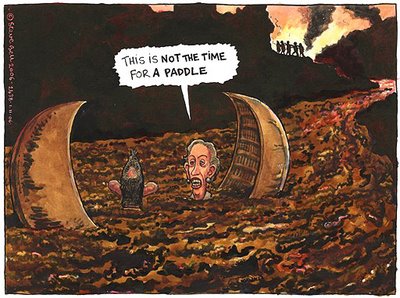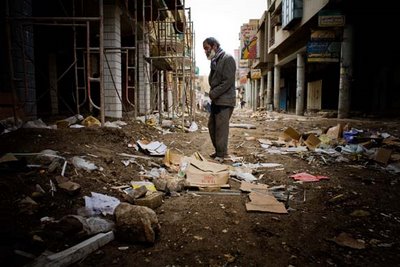Just how long exactly is this piece of string?
139 Labour MPs voted against the war in Iraq. Some of those who voted against that night have either left parliament or lost their seats since then, but even so you would have expected a higher figure to have rebelled than the number who ultimately supported the Conservative motion for an immediate inquiry into the war last night: just 12 bothered to do so, most of them members of the usual "awkward squad".
Reading the debate on TheyWorkForYou, it's easy to see why. While on that night five years ago party politics was mostly eschewed, except perhaps on the Conservative side, yesterday's debate was almost a summation of everything that is wrong with parliament. Each side, and every political party, with the exception perhaps of the nationalists, was blowing their own trumpet or falling back entirely on blaming the other side for their reasons for either voting for or against.
William Hague, opening the debate for the Conservatives makes a valiant effort and it's easy to see why he's such an assured parliamentarian whose time with the Conservatives still might come again. The case for an inquiry now is simple: the government itself has promised one, with its single argument being that it's "time is not now". This has been its position for 18 months, since the execrable Margaret Beckett made the self-same arguments that David Miliband made yesterday. An inquiry cannot apparently be held now for four reasons, or rather, the Conservative amendment deserved to be defeated because: the government has promised an inquiry but "now is not the time"; because the armed forces are still involved in "important operations" and these "important operations" are not as limited as the opposition parties make out; that despite the other parties suggesting that important lessons are to be learned from an inquiry, something that the government apparently agrees with as it also wants an inquiry, just not one now, the military has been learning "on the job"; and finally that memories will not fade and emails won't be lost because there have already been four inquires into the Iraq war and so apparently most of the material that will be gone over in an eventual inquiry is already available.
You have to give credit to Miliband: for someone who apparently secretly held anti-war views, he sure can talk bollocks at length in the chamber in an ultimately successful attempt to stop the perfidious Conservatives from opportunistically whacking Labour about over Iraq. That, in a nutshell, is the real government argument against an inquiry now, and one which some unsubtle MPs even made directly against the Conservatives. All four of Miliband's arguments are completely spurious: the first on the basis that this inquiry will if the government has its way never happen, especially as there continues to be no end in sight to the occupation whatsoever; the second, breathtakingly, for the exact opposite reason that Miliband states, concerning the uprising in Basra, where our troops are not involved, showing just deep these important operations actually go; the third, the idea being that the military has learned on the job is valid if you consider that there haven't been any abuse scandals since the early days of the war, when it's actually always been the government itself and its complete lack of influence over the American policy which really needs to be answered for; and the last is utterly redundant because up until recently the government was arguing against any further inquiries because the four themselves had been wholly sufficient!
To be fair to some of the MPs, they make all these points and more along the way, repeatedly interrupting Miliband and his pathetic justifications. The real rhetorical gymnastics was being performed by the loyalist Labour backbenchers who want an inquiry but have no intentions of letting the Tories be the ones who take the credit for forcing one; hence why Mike Gapes and others have stood up and said they won't support an inquiry that doesn't also look back over the decades and examine policy over Iraq since Domesday. This enables them to whack the Tories over their arming and courting of Saddam whilst meaning that they can still profess to support an inquiry in principle, just not a Conservative one. That such an inquiry would be potentially as endless as the Bloody Sunday fiasco, and that it would take years before anything was actually published, let alone any lessons learned doesn't seem to matter to the loyalists while it allows them to oppose the Conservatives. It's difficult to agree with Michael Howard, but the Scott Inquiry, limited as that was, has dealt with the arms-to-Iraq scandal for now; it's ridiculous to dredge that up again when what is of real concern is what happened from 2001 up until the present day. What it does allow is for the Labour loyalists who actually want an inquiry but don't want to damage the government any further at the moment to keep a clean conscience. Forget about learning from the mistakes of the past, what's more important and what always will be more important is the party's public standing, rock bottom as it deservedly is.
It seems remarkable that it's the Conservatives, by far the most gung-ho for war that now have the clearest and cleanest reasons for calling for an inquiry. While it is undoubtedly opportunistic and a further attempt to damage the government, it's also clear that Hague, if not the other smirking brats on the front bench, genuinely believes there needs to be one, as do the other Tory old guard that are now being squeezed out, such as Ken Clarke and Malcolm Rifkind. At least those two can reasonably claim that they opposed the war from the outset, as the Liberal Democrats can, but the Lib Dems have muddied their influence by now harping on about how the Conservatives provided the government with its mandate for the war. This is a reasonable enough point, but it's time to move beyond the finger jabbing and who was wrong and who was right and instead use this to ensure that nothing so calamitous both for this country and especially for Iraq itself is allowed to happen again. Towards their short-term gain, the Lib Dems have thusly launched holdthemtoaccount.com, which is something that should have been done in previous elections and in some cases indeed was. To still be going on about holding individual MPs to account in 2008 is ridiculous and far, far more opportunistic than the Conservatives themselves are being. That they're doing this because the Lib Dems' one sole-memorable policy after the abolition of their 10p on the top rate of tax for those earning over £100,000, apart from perhaps Vince Cable's prescience over Northern Rock, is their opposition to the war ought to consign it the dustbin of political gimmicks.
The whole debate was, and as parliament increasingly seems to be, a complete waste of time and effort. While America has held inquiry after inquiry into the war even while over 100,000 of their troops remain in action, all without damaging their morale or their ability to fight effectively, we're left with all the main political parties squabbling amongst themselves while the blood and treasure continue to be spent. We're left in the age-old position of wondering just how long a piece of string really is, the answer being, as always, that it's as long as you want it to be. Like others, I reason that a Labour government, on the whole, will always be better than a Conservative one. That doesn't mean however that when these obscurantist, lying, two-faced time-wasters are deservedly thrown out of office that I won't be one of those cheering from the rooftops. Those 12 MPs that voted for the Conservative amendment therefore deserve the praise and final mention in this post.
The 12 Labour MPs who supported Conservative calls for a full-scale inquiry were:
Labels: Conservatives, David Miliband, Iraq, Iraq disaster, Iraq five years on, Iraq inquiry vote, Labour loyalists, Liberal Democrats, politics, William Hague



